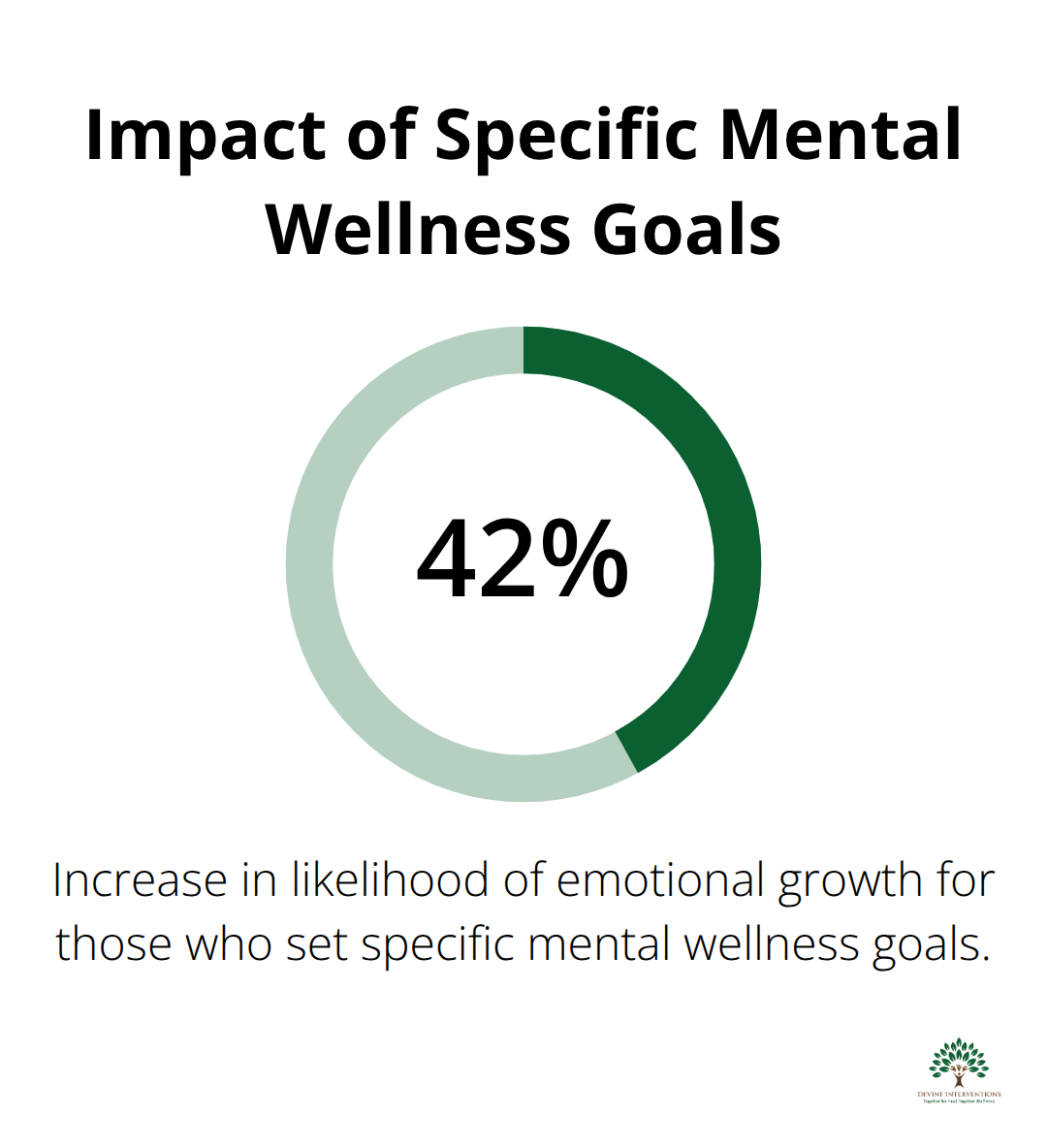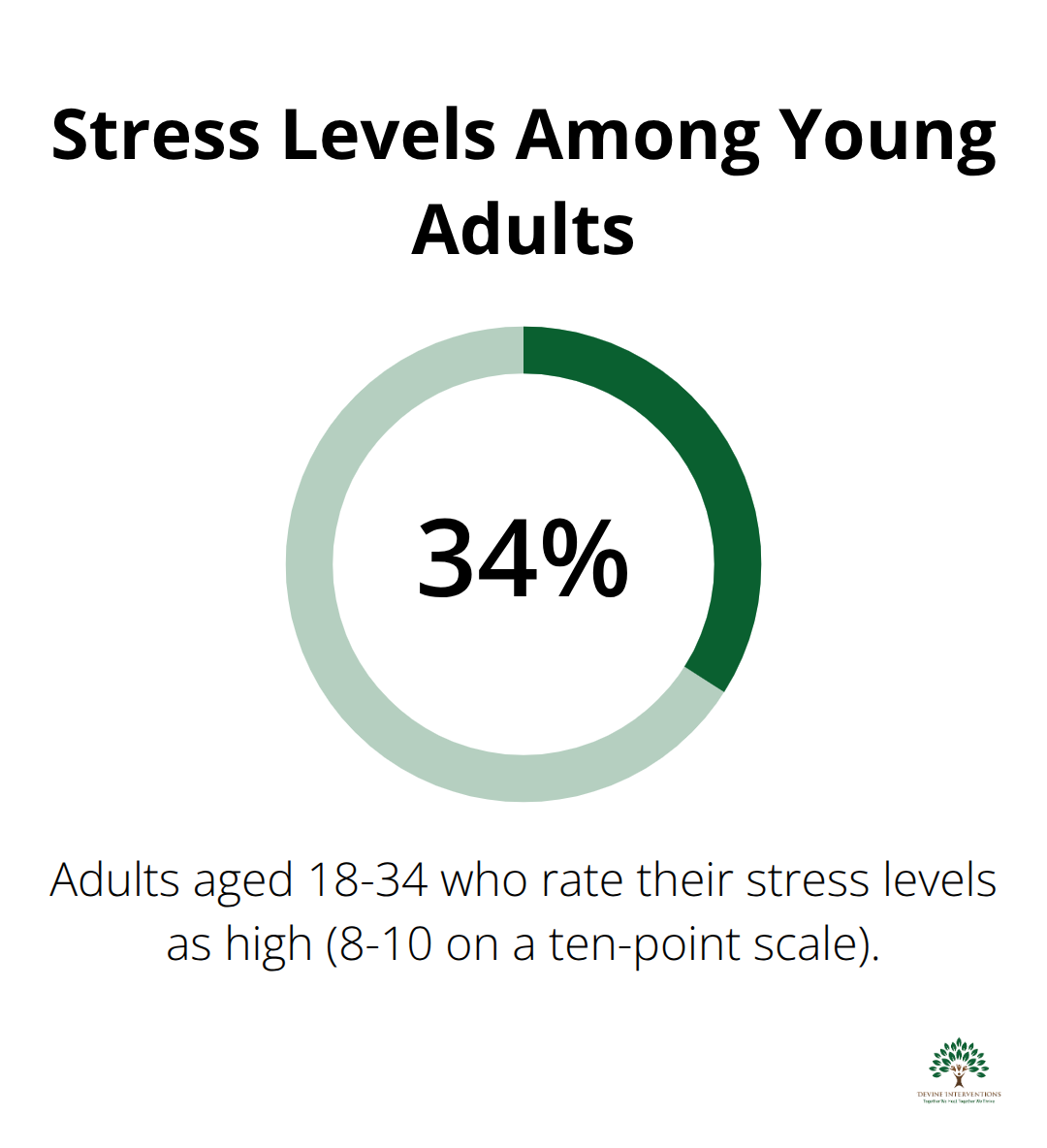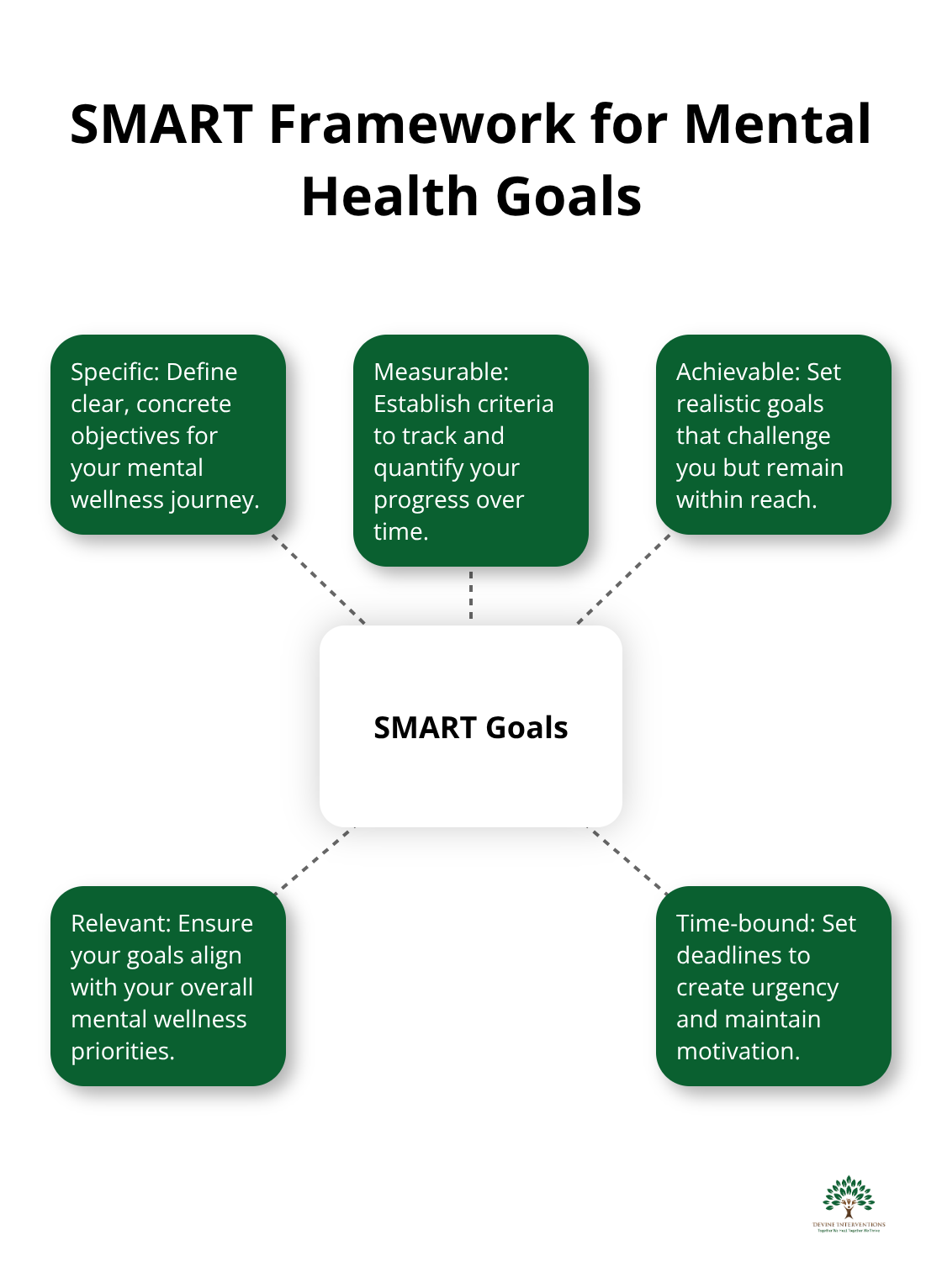Mental health struggles affect 1 in 5 adults annually, yet many people feel overwhelmed about where to start their wellness journey. Setting clear, actionable goals can transform this challenge into manageable steps.
We at Devine Interventions believe that having specific mental wellness goal examples makes the difference between hoping for change and actually achieving it. This guide provides practical goals you can implement today.
What Makes Mental Wellness Goals Different from General Health Goals
Mental wellness goals differ fundamentally from traditional mental health treatment because they focus on building strengths rather than just fixing problems. While mental health typically addresses diagnosable conditions like depression or anxiety, mental wellness targets your overall psychological flourishing through daily habits and mindset shifts. Mental stimulation helps to keep your brain cells healthy and prevent cognitive decline, supporting your journey toward improved well-being.
The Power of Intentional Goal Setting
People who set specific mental wellness goals increase their likelihood of emotional growth by 42% compared to those with vague intentions like wanting to feel better. Studies demonstrate that individuals who write down concrete mental health objectives show measurable improvements in self-confidence and stress management within 30 days. The key lies in specificity – instead of hoping to reduce anxiety, successful individuals set targets like practicing five minutes of daily breathing exercises or limiting news consumption to 15 minutes per day.

Essential Components of Effective Mental Wellness Goals
Effective mental wellness goals contain three non-negotiable components that separate successful outcomes from wishful thinking. First, they must be measurable through concrete behaviors rather than feelings – you track meditation minutes instead of monitoring happiness levels. Second, they need realistic timelines that account for your current life circumstances – you commit to weekly therapy sessions rather than daily hour-long walks when you work 60-hour weeks.
The Accountability Factor
Third, successful mental wellness goals require built-in accountability systems, whether through apps, journals, or trusted friends who check your progress weekly. Research shows that sharing your mental health objectives with others significantly improves success rates, particularly when working with mental health professionals who understand goal-setting frameworks.
These foundational principles set the stage for exploring specific categories of mental wellness goals that address different aspects of your psychological well-being.
What Mental Wellness Goals Should You Set
Effective mental wellness goals target three specific areas that research consistently links to improved psychological health. The American Psychological Association reports that 34% of adults aged 18-34 rate their stress levels between 8 and 10 on a ten-point scale.

Stress Management and Coping Skills Goals
The most successful stress management goals involve concrete daily practices. You commit to 10 minutes of morning meditation, practice progressive muscle relaxation before bed, or use the 4-7-8 breathing technique during work breaks. People who track their stress triggers through smartphone apps report better emotional regulation compared to those who use general wellness approaches.
Effective stress goals focus on immediate, actionable responses rather than abstract concepts. You might schedule three deep breathing sessions daily (morning, lunch, evening) or practice mindfulness during routine activities like washing dishes or walking to your car.
Relationship and Social Connection Goals
Research shows that social isolation and loneliness have a serious impact on physical and mental health, quality of life, and longevity, which makes relationship goals essential for mental wellness. Effective social connection goals focus on frequency and quality – you schedule weekly coffee dates with friends, join community groups that match your interests, or commit to three meaningful conversations per week with family members.
Research from Harvard’s Grant Study demonstrates that strong relationships predict happiness better than income or career success. The most impactful social goals involve vulnerability and consistency. You share one personal challenge monthly with trusted friends or dedicate 15 minutes daily to check on someone in your support network. People who maintain regular social contact show lower rates of anxiety and depression.
Self-Care and Daily Routine Goals
Daily self-care routines create the foundation for sustained mental wellness, with studies showing that consistent practices improve mood stability. Effective self-care goals must be specific and scheduled – you take a 20-minute walk every morning, prepare nutritious meals on Sundays for the week, or maintain a consistent sleep schedule with 7-8 hours nightly.
The most successful individuals treat self-care appointments like business meetings (they block calendar time for activities that restore energy). Physical movement proves particularly powerful, with moderate exercise reducing anxiety symptoms within weeks according to clinical trials.
These specific goal categories provide the framework for your personalized approach, but the real transformation happens when you assess your current state and create measurable objectives that fit your unique circumstances.
How Do You Build Your Mental Wellness Action Plan
An effective mental wellness plan requires honest self-assessment followed by structured goal creation that matches your specific circumstances. While thorough mental health assessments before setting goals can improve outcomes, the specific research methodology varies across studies. Rate your current stress levels, sleep quality, social connections, and daily mood patterns on a 1-10 scale for one full week. Track specific triggers that affect your mental state – work deadlines, family conflicts, or financial concerns – because you identify patterns that help you target the right areas for improvement.
Self-Assessment That Actually Works
Effective assessment goes beyond general feelings and focuses on measurable behaviors. Count how many hours you sleep nightly, how often you exercise weekly, and how frequently you connect with supportive people monthly. Studies demonstrate that people who track concrete behaviors rather than emotions create more successful mental wellness plans. Use smartphone apps or simple journals to record daily mood fluctuations alongside specific activities, meals, and interactions. This data reveals which habits support or undermine your mental health and wellness (and provides the foundation for targeted goals).
The SMART Framework for Mental Health Goals
Transform your assessment insights into SMART goals that drive real change. Instead of wanting to feel less anxious, commit to practice 10 minutes of daily meditation for 30 days. Rather than hoping for better relationships, schedule two meaningful conversations weekly with friends or family members. Research shows that specific, time-bound mental health goals produce measurable improvements within 4-6 weeks. Write down exactly what you will do, when you will do it, and how you will measure success. Research indicates that emotional intelligence relates positively to psychological well-being and achievement outcomes.

Progress Tracking Systems That Work
Weekly progress reviews separate successful mental wellness plans from abandoned good intentions. Schedule 15-minute weekly check-ins to evaluate your goal progress, note which strategies work and which need adjustment. Clinical studies reveal that people who adjust their mental health goals monthly based on real results maintain momentum longer than those who stick rigidly to original plans. Use simple methods like smartphone apps, wall calendars with check marks, or brief journal entries that capture both successes and challenges (the key lies in consistent measurement rather than perfect execution).
Final Thoughts
Mental wellness goal examples provide the roadmap from overwhelm to meaningful action. Research consistently shows that people who set specific, measurable objectives achieve better emotional outcomes than those who rely on general hopes for improvement. The most successful individuals start small with concrete daily practices like 10-minute meditation sessions or weekly social connections.
These individuals track progress weekly and adjust goals monthly based on real results rather than perfect execution. Professional support becomes necessary when daily function suffers, symptoms persist despite consistent self-care efforts, or you experience thoughts of self-harm. We at Devine Interventions offer comprehensive mental health services that support your wellness journey through evidence-based treatment approaches.
Your mental wellness transformation begins with one specific goal today. Whether you commit to five minutes of morning breathing exercises or schedule that overdue conversation with a friend, action creates momentum. Professional guidance can accelerate your progress through personalized treatment plans that address your unique circumstances and challenges.







